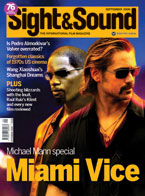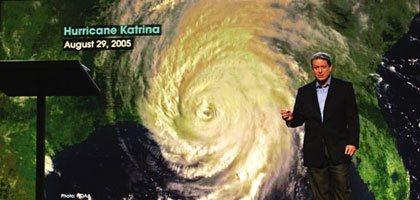Primary navigation

USA 2005

Reviewed by Amy Taubin
Our synopses give away the plot in full, including surprise twists.
A documentary based on a multimedia lecture about global warming, which former US vice-president Al Gore has been giving all over the world since his questionable defeat in the 2000 presidential election. The lecture is presented in its entirety, pieced together from presentations at various venues. The film-makers also accompany Gore on the road, recording his musings about his near 40-year engagement with environmentalism and his moral commitment to communicating the message that humanity is facing nothing less than a "planetary emergency". These informal conversations and scraps of autobiographical material are used as cutaways from the public forum. Although about two thirds of the film is devoted to the lecture itself, it is the back and forth between Gore's public and private faces that drives the narrative.
An eco-horror movie that is anything but escapist entertainment, Davis Guggenheim's documentary An Inconvenient Truth elicits one audible gasp after another from viewers. It does so through its clear, low-key presentation of the evidence that global warming is not only incontrovertible fact, but is now accelerating at a rate few scientists predicted. Al Gore, who in a rare flash of irony refers to himself as the man who "used to be the next president of the United States", stands at a lecture-hall podium, looking like an awkward, more portly version of Jimmy Stewart. Focusing on the connection between the rising level of heat-trapping carbon dioxide in the earth's atmosphere (largely caused by the burning of fossil fuels and deforestation) and global warming (which has already resulted in rising air and ocean temperatures, increasingly severe droughts and storms and the melting of the polar ice caps), Gore relies on charts and pairs of back-projected, before-and-after photos to illuminate and drive his points home. The famous photo of the earth taken on one of the first space missions is juxtaposed with a recent image taken from space: 40 per cent of the polar ice caps have melted in the past 40 years.
In one of the film's only engineered effects, Gore mounts a hydraulic lift to illustrate the steep upward curve of parallel lines representing global temperature and carbon-dioxide concentration over the past ten years. "You've heard of 'off the charts'," he quips. The clumsy joke has the chill of gallows humour.
Gore's thesis is that we have about ten years to arrest a warming trend that is not merely "cyclical" and which has resulted in ten of the past 14 years being the hottest in recorded history. Without immediate action, we risk an irreversible slide into global destruction. "Is it possible that we should prepare for threats other than terrorism?" he asks in one of the few moments that hint at the anger and contempt he feels for the Bush administration. A similar moment occurs when he details how a Bush public relations appointee changed the wording of a Nasa report to make it appear that global warming is mere speculation rather than a proven theory on which virtually 100 per cent of scientists agree. The fact that more than 50 per cent of journalistic coverage in the US still presents global warming as debatable if not an outright hoax proves how successful the Bush strategy has been. Remember that almost all media outlets are owned by the very corporations which would find it most "inconvenient" to convert to a green economy. The overall economic cost of such a conversion is an issue that Gore glides over just a bit too quickly, but that doesn't damage his basic argument that change is an absolute necessity and a moral imperative.
But if global warming has been a central concern for Gore since his college days in the late 1960s, why did it go virtually unmentioned in his failed 2000 presidential campaign? "It is very difficult to get a man to understand something if his salary depends on his not understanding it," says Gore, quoting the American writer Upton Sinclair. Implicating himself in the "level-five denial" that humanity collectively suffers from, Gore explains how his family continued to grow tobacco and he continued to support pro-tobacco legislation long after the US government confirmed the link between smoking and lung cancer.
It was only when Gore's sister died of the disease that his family quit the tobacco business. The implication of the story is that having learned his lesson through personal loss, Gore is ready to take on the establishment, no matter what the cost.
Like recent break-out documentaries such as Fahrenheit 9/11 or Supersize Me, An Inconvenient Truth ties a life-or-death social/political issue to a single crusading personality. The strategy has enormous audience appeal; a film that appears to be little more than a Powerpoint lecture on a subject no one wants to confront has already grossed close to $15 million while on limited release in the US. Does its success portend the second coming of Al Gore? Only someone who wants to divert attention from the issue of global warming would tar An Inconvenient Truth as a presidential campaign film. Nevertheless, you have to think, at least metaphorically, that a way of playing for time against imminent ecological disaster would be to turn back the clock to 2000 and allow the American people to elect Gore all over again.